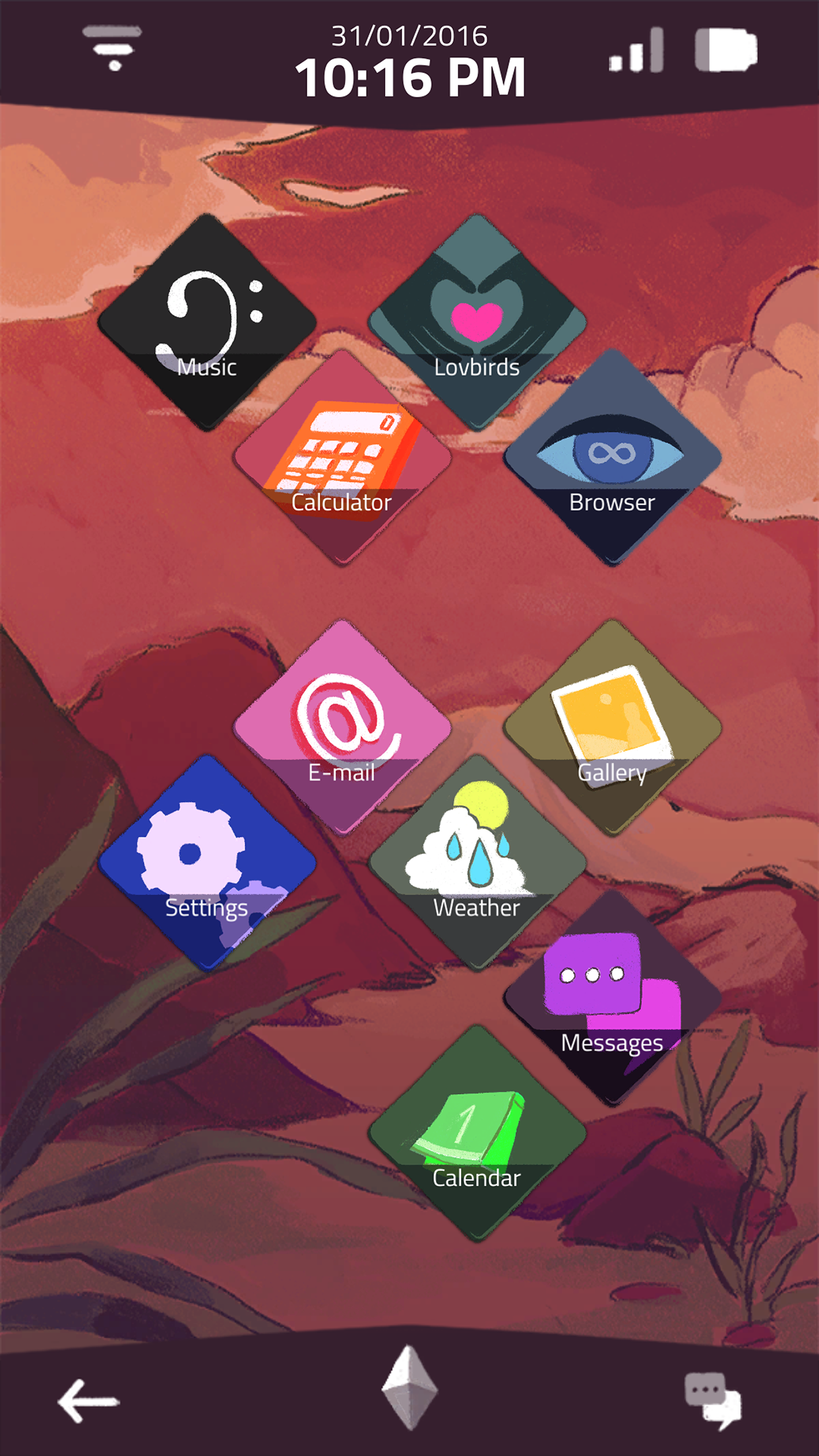A Normal Lost Phone bothers me. As an adventure/puzzle game, it is experimental and intelligent. Players must learn more about a lost phone and its owner. But as the game begins to explore LGBTQ themes, it takes a turn for the uncomfortable.
The set up is simple. You have found a phone. Examining text messages and learning more about the owner unlocks more and more information. You’ll uncover Wi-Fi passwords, find hidden apps and piece together a story by reading forum posts and text messages. A Normal Lost Phone‘s unconventional structure leads to genuine brainteasers that provide a robust test of your deductive skills.
As you progress, the game feels more and more invasive. It starts with the discovery of a dating app with two profiles: One for a man, another for a woman. They’re both for the same person, Sam, the owner of the phone. It turns out that Sam is a young transgender woman struggling to come out to her family and school friends.
Sam has been chatting with a friendly and helpful stranger through her dating app. He has sent a picture and asks that Sam do likewise. To proceed you need to use Sam’s personal information to find a picture of her on a transgender web forum, copy it and send it to the stranger.
What the fuck?

The framing devices is already sufficiently invasive, but this moment allows the player an unprecedented and uncomfortable amount of control over Sam. You can choose to send a photo of her while she is not presenting as female. While the other participant is one of the few people aware that Sam is transgender, this feels dangerously close to outing a closeted trans person. Who am I to decide how much Sam would share with this person? A Normal Lost Phone claims to be a game where you “build empathy with the characters, allowing to explore difficult topics”. But it does so at the expense of the very character that you are supposed to care about. Sam has no agency. She is is absent, unable to consent or comment on your personal invasion. She is an object to be analysed. She is also a damsel to save and protect.
I was told by the team that a trans person was involved directly with the project and that numerous trans people were interviewed about their experiences. I also acknowledge that this is a difficult subject. No one’s lived experience is the same. This structure is the vehicle the creators chose to tell this game. They clearly have less of an issue with it than I do.
For the team, the invasiveness was necessary “in order for the player to see the world through Sam’s eyes”. I can understand that desire. But I think the experiment fails. It is exploitative, fetishising a deeply personal struggle and turning it into emotional tourism. If these are the techniques used to explore queerness in video games, queer games have a long way to go.
A Normal Lost Phone wants to say something. But for an empathy game, it doesn’t seem care that much about Sam. It cares about the player and satiating their curiosity. It’s a mistake. Queer games need to stop commodifying and exoticising the queer experience at expense of nuanced stories. They need to craft narratives with queer characters that are not defined exclusively by their queerness and not positioned as curiosities. Only then will empathy games like A Normal Lost Phone will actually be empathetic.

Comments
20 responses to “A Normal Lost Phone Tries To Explore Trans Identity And Falls Short”
I had no idea this game had LGBTQ themes, it doesn’t mention it on the Steam page.
The article is a spoiler.
OMFG. SO sensitive. Some of these articles seem to be made out of the same stuff as my areoles.
You probably should get that checked.
Trans people are generally more sensitive to trans issue and trans representation then us non-trans folk, so I think it’s okay if the author is a bit sensitive.
I don’t even feel like the fact that the person is trans is relevant here. If you find a lost phone you shouldn’t be going through anybody’s personal information, that’s deeply, deeply creepy. Open up the contacts and try and find a home number or the number of a family member so you can negotiate returning the phone, or turn it over to the cops. Don’t go through their photos and dating profiles and shit, wtf is that are you a serial killer?
Then there’s the step above the snooping, which is actually sending content from the phone to other people. That’s messed up regardless of who’s phone it is. This game sounds less like an ’empathy building character study’ and more like a ‘sociopath finds a phone simulator’.
That said, it’s worth remembering this is just a game – it isn’t real, nobody actually gets hurt. It’s probably designed to provoke these sorts of feelings.
There’s loads of games like this which deliberately push the player into uncomfortable voyeurism – because otherwise they’d be remarkably boring and nobody would “play” them.
Yeah fair point. Same with video game violence etc.
Yeah, that’s what I was thinking, too. A game where you rummage through a person’s phone is objectionable, but people have no problem with hundred other games where you shoot people in the face?
I agree.
But I can also see how the lost phone scenario leans closer to a real life scenario as opposed to some of the scenarios of video game violence.
I havent played it, so I can’t really comment on what themes the developers was trying to convey.
Personally there doesn’t seem to be a hook there that would make me want to go beyond normal action.
In violent games there is often a narrative or reason (I know how silly that sounds) as to why I’m killing somebody.
This game sounds like it’s a story about me finding a strangers phone and trying to motivate some weird behaviour under the guise of kindness.
Why wouldn’t I just call the last few recent calls if possible and/or hand it in to a store/mall/police station?
I could push through the game, It just wouldn’t compel me any.
Make Sam my friend who died, I dunno, murder or suicide or something.
Boom, I have my vehicle, Sam was my pal and I wanna know what happened.
Even if nothing happened, I would find the revelations of SAMs hidden life to be far more thought provoking.
Yeah, I don’t object to the game’s content at all. I actually think it’s kind of a neat concept. I was just pointing out that doing this IRL would be super creepy regardless of the gender identity of the person who owned the phone.
The game gives you the option of being a creep.
The author may say this with negative connotations but I believe it is actually the intent of the game? Common people rarely challenge themselves to explore their emotions, let alone those of someone else, a someone that is fundamentally different to them. The conceit of the game would be loathsome in real life regarding a real person, but as a game and regarding a fictional person, in order to make people consider things from a different point of view, has validity, I believe.
I think it’s also worth saying that calling a game “emotional tourism” is an odd point of critique to begin with. Aren’t all games that evoke an emotive response or explore a character’s emotions an example of “emotional tourism”? The idea that “emotional tourism” is a bad thing is based on how invasive and insensitive it is to an individual person and their privacy/dignity, which is a total non-issue in a fictional medium.
To me, what the author of the article is saying is like saying that it’s wrong to show a fictional character in the privacy of their home on the basis that it’d be wrong to show a real person in the privacy of their own home (without intent and consent, obviously). As an argument, it doesn’t really pass the sniff test. The amount of exposure between a character and their audience shouldn’t be following the same guidelines as an interaction between a real person and an audience, for a glut of reasons.
Find a lost phone? Hand it to the closest Police Officer or Station. Anything less is theft.
It’s easier to call one of the most recent numbers and drop it off to them for the owner to pick up.
That is making a reasonable attempt which is permitted. However in the real world most phones are locked behind a pin or swipe pattern so handing it to Police is your best option.
Oh yes, most definitely then. There is no point keeping at that point anyway, it’s useless to you.
Pretty much.
Or you get lucky and see a prompt that comes up from an already-installed/configured ‘lost phone’ app, or answer a call from someone before the battery dies (unless you keep it charged on your own charger before turning it in, if the local cop-shop is too far out of the way for a convenient drop-off).
But really, transit centre lost property stations or police are your most responsible and ethical options.